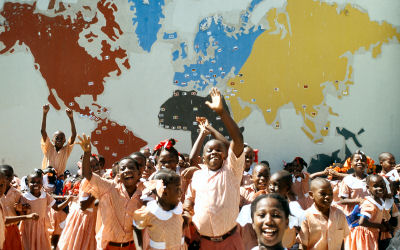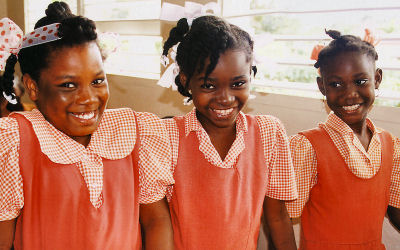SOS Schools in Haiti
Note: Following the 2010 Haiti Earthquake the SOS Schools in Port au Prince, Haiti have become emergency relief centres.
SOS Primary and Secondary School Port Au Prince/Santo
The combined SOS Primary and Secondary School Port au Prince opened in 1984. There are over 300 pupils (230 primary and 70  secondary) in nine classes.
secondary) in nine classes.
By making high standard education available to the children of poor families who otherwise could not afford a school of the same quality, the SOS School has obtained a very good reputation and a high level of acceptance with the local population.
Update report from 2008:
With the increase of the community centres there is a demand in the schooland there were no spaces in the morning to receive the children from the six new community centres. After a deep analysis, it was requested to the regional office the opening of a double turn to facilitate the access in the schools of all the children who come from the community centres and the school began with the first two elementary years. This decision allows that more children can obtain basic education in the school.
This change forces the educators to also make adjustments in the schedule and in the content. The schedule is from 7:30 a.m. to 12:30 p.m. for the first group and from 1:00 to 5:00 p.m. Regarding the administrative area, the school is administered by the same director of the SOS Social Centre and community centres helped by an assistant director in charge of pedagogics and discipline.
The academic results of the school are very good. There is always success in the official tests which gives pride to the students and professors of the school. The professors are motivated, they feel well in this work and they organised extra-curricular activities such as visits to historical sites so the students know their country, their roots, also to compare the theory to the reality.
SOS Primary and Secondary School Cap Haitien

The combined SOS Primary and Secondary School at Cap Haitien was opened in 1989. There are more than 410 pupils - 240 primary and 170 secondary - in seven classes.
The school ranks among the best of the region. Eight teachers hold lessons in French, Creole, maths, social science, natural science, and other subjects. The school day runs from 7.30 a.m. to 4.30 p.m. including a one hour lunch break. Later, in the afternoon, the pupils have the opportunity to work in the affiliated workshops where they get trained in hairdressing, tailoring or cookery. In addition, they can take part in extra classes, such us dancing, art, or sports. Modern principles of educational psychology are applied and the maximum number of pupils per form has been reduced from the national average of 60 to 35.
Update report from 2008:
The SOS School
Cap Haïtien after the implementation of the family strengthening
programme in the country, the school receives only the children of the
village and the children of parents who are in the programme. This year
the school works in two turns with the purpose of recieving all the
children who come from
the 16 community centres and solves the problem of the families of the
programme which cannot afford private schools for their children
because there is no public school in the area.
The parents´s
committee works very well and supports a lot the professors in the
pursuit to educate their children. The parents work in turn in
commissions; help in the cleaning and in order so that the school
always looks well. The results in official tests alare always good,
which gives a good reputation to the school and the professors feel
proud to speak of their performance. The parents´s committee also
participated in the excursions that were done every year with the
students in the different historical sites to extend the knowledge of children on the culture and the way of living of people of different zones in the North department.
In
the school, everybody of any social rank wants to have their children
there, for the administration, its discipline, its performance, its
reputation in the entire city, the facilities that always look well, it
is located in a particularly green zone. Also with the dynamism of the
people in charge of the school, it obtains from the National Education,
state organism responsible for the education in the country, many
didactic materials that help much in the preparation of class for the
children. These materials are usefull mainly for the children from the
family strengthening programme that has difficulties to buy the scholar
supplies for their children.

 Return to Schools Wikipedia Home page…
Return to Schools Wikipedia Home page…
